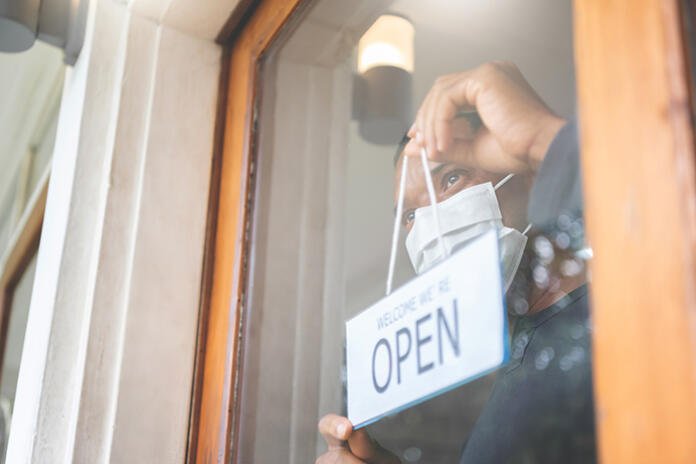
Act of God — these three words universally strike at the heart of every small business. In contracts and insurance policies, the dreaded phrase describes the unpredictable chaos that can be conjured by the forces of nature, laying waste to even the best-laid plans. Caribbean-American small businesses, particularly those in South Florida, are no strangers to weather catastrophes. The prolonged economic crisis caused by COVID-19, however, is unprecedented. “It’s brought a high level of uncertainty to the market, especially in areas that are common among Caribbean entrepreneurs such as hospitality, retail, and food and beverage,” says Kurt Dyer, a Jamaica-born business adviser and vice president of strategic operations at Fortune 500 construction firm, Lemartec.

He argues that businesses can endure such trying times with a willingness to sacrifice and adapt. For Caribbean-American small businesses navigating this uncharted territory, Dyer breaks down the essential steps to regroup and reevaluate. “In a very real sense, business is like being at war,” he explains. “You have to be thoughtful, weighing the pros and cons of advancing or retreating. But if you don’t take these things into consideration, then you become a casualty.”
Cut Overheads
Faced with reduced revenue, many Caribbean-American small businesses turn to emergency loans to continue forward. Dyer advises first curtailing operational costs before assuming debt. “You need to evaluate how you manage your business and look for efficiencies,” he says.
For renters, he recommends calculating the potential benefits of breaking the lease. Removing such a major expense from the books may be worth paying the penalties for leaving early. But first, “know your terms,” he advises. “What are your exit clauses? Then do a cost-benefit analysis to understand what you are going to lose.” In addition, “a great CPA (Certified Public Accountant) can help you find tax benefits from your losses.”
To reduce cash outflow, Dyer also advises that owners renegotiate with suppliers for payment flexibility. “If they normally give you a 90-day credit, ask if they can extend it to 120 days,” he suggests. “For them, it’s always better to have a paying customer than a non-paying one.”
Perhaps the hardest cut — but the most necessary — is to personnel. Dyer acknowledges this is an emotional choice for tight-knit small businesses. However, furloughing employees now is better than losing the business forever. “You are doing them a disservice when you keep them and can’t afford them,” he notes. “You then won’t have a business to which they can return.” Instead, Dyer advises that owners focus on individuals that best serve their current needs. “You want to have someone in your shop that can help you navigate this storm.”
Adapt Your Business Model
With continued social distancing protocols, it’s far from business as usual for those who normally operate based on face-to-face interactions. “If you still hold the mindset that the fundamental tenets of your business remain the same after COVID-19, you’re going to fail,” advises Dyer. “Businesses that survive have to readjust their business model to meet the market.”
Many operations can find alternate revenue streams by using social media to market and sell to their customers. Others can pivot to more socially distant operations. For example, Dyer has seen businesses like restaurants successfully transition from on-site service to delivery and curbside pick-up. “They are now in a better position for the future because they had to adapt,” he says. They also may have expanded their possible customer base.

Reach Out for Advice
When looking for new ways to innovate, it’s important to connect with knowledgeable people for guidance. They could be more experienced entrepreneurs in the same field, or those with specialized skills — from building online sales platforms to applying for grants. “Because during a crisis, alliances matter,” says Dyer. “There’s wisdom through counsel.” Chambers of commerce are a fruitful resource, offering workshops where members exchange strategies.
Risk-Proof for the Future
Dyer predicts that market instability will extend well into 2021 as COVID-19 cases continue to rise. Despite recent breakthroughs in vaccines, wide scale inoculation won’t be possible for at least a year. In response, businesses need to manage their risk exposure.
In the short term, this means preparing for more closures. “If you’re in an environment where they’ve had shutdowns in the past, plan for a shutdown (again),” he notes. Preserve any operational adjustments made for social distancing, so you can reenact them quickly, as needed.
This is a good time to reevaluate contracts for additional protections. “If you didn’t pay attention to your lease agreement before, you sure are going to pay attention now,” jokes Dyer, who recommends discussing business interruption clauses with landlords. He suggests examining how your business insurance specifically addresses losses due to a pandemic. It’s also a great time to seek better terms from vendors, like discounts for quicker payment cycles.
Thinking about the big picture, Dyer sees the positive potential of reinventing in response to the pandemic; these current challenges could become opportunities in disguise. “It’s about taking the lessons we learned forward,” he said. “You’re always trying to get lighter and more agile during a time of crisis. But it’s also in these times when we become the most innovative.”































